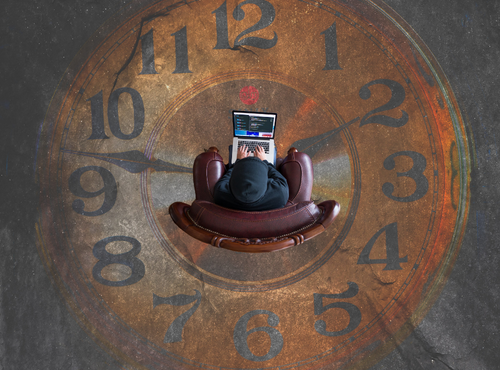Is Your Job Too Demanding?
6 minute read.
“There is More to Life Than Work”
We hear this a lot, right? We receive messages daily about how our work/life balance “should“ be.
We are told that if we hold down jobs, we will build our skills and confidence, helping us feel happier, more secure and more confident. We feel that we should focus on our career because we want to flourish in a field that we are truly passionate about.
Truthfully, we work so that we can have income, housing and food security. We must work in order to survive, and for many workers, job satisfaction is not a choice.
As of 2022, 65% of US workers report feeling satisfied in their jobs, while 20% report feeling passionate about their work. These numbers may not shock you, but considering we spend almost half of our waking hours working, one would hope that job satisfaction is more common.
I personally employ daily reminders that there is more to life than my job. On the corkboard next to my desk, there a list of “Before Work Affirmations” that I recite as needed.
One of these affirmations is “My income sustains my happiness.” Not my job, my career or what I do during the work day, but my income. My income keeps me from experiencing any insecurity, and it allows me to pursue a lifestyle, hobbies and experiences that align with my interests and values.
That is not to say that I don’t love my job. Being a therapist is my calling—helping people heal and experience liberation brings me great joy. I decided a long time ago that if I needed to work, I wanted to help people. But if I woke up tomorrow and my student loans were gone, food and housing were basic provided rights (as they should be), travel was free and I had no other obligations? I would retire.
Don’t Let Your Job Consume You
First, let’s make some room for grace. We are all in quite a pickle right now. Wage stagnancy, inflation/profiteering, worsening public health and disconnection within our communities leaves us looking for an escape. That escape can come in the form of addictive behaviors, from drug and alcohol abuse to overworking.
You may not have a choice in the quality of job you have. The threat of income insecurity map keep you in a job that brings you dissatisfaction or downright despair for years.
If alternative employment is accessible to you, you have every right to pursue something that will make you happier. If you are unsure whether or not your lack of satisfaction and stress are work related, I put together this nifty list to help you navigate the thoughts and feelings you may be experiencing.
Again, room for grace and self-compassion. As I often remind clients, you are doing the best you can with what you have.
Signs your job is too demanding.
You are unable to finish your work on time.
Workplaces dictate the amount of work every employee must complete, and how much time the work should take. Everyone works at a different pace. We all have bodies that have different abilities and functioning levels. Some of us require accommodations at work to make our jobs more doable.
But sometimes, the amount of work assigned is simply too much. For many workers, the amount of time given for a specific task is decided by an individual or group of individuals who value profit over quality, and will exploit a worker’s labor towards that goal.
For example, in the early years of my career, I did group therapy and inpatient psychiatric hospitals. The amount of work I did, the length of time it took to complete progress notes, treatment plans and assessments, was decided by people that had not worked a clinical hour in years, if at all.
Because of this, I was never allotted enough time to complete my work in 8 hours, resulting in daily overtime. Despite the emotional labor that comes with being a therapist, my managers wanted to be sure that I earned my $20/hour by relentlessly checking my productivity, criticizing my peers and myself for being lazy if we did not meet their high standards.
If you find yourself struggling to finish work every day by the end of your shift, your job is asking too much of you.
2. The workday doesn’t end at 5pm.
The discourse around work/life balance often lays the responsibility of boundaries on the worker. Meaning it is the worker’s responsibility to not answer emails, calls and other correspondence after their work day is over. This is true across all types of jobs, from the office to the construction site.
But what about management’s responsibility? What about messages fed to workers from the culture of the workplace?
If you feel that your job is not safe if you are unavailable after 5, then your workplace may be the issue. As mentioned before, the 8 hour day was a compromise that workers won by direct action and protest, with constant push back, until it was normalized and widely accepted. A full 8 hour day is enough (if not too much). If you are expected to work after work, that is something to be curious about.
(This also applies to shift work, individuals who work evening and night shifts and those who work longer blocks that add up to 24 hours.)
3. You’re punished for taking time off.
As capitalism continues raging, trying to prove its relevance, more and more Americans are waking up to the reality that there are other options. Factors driving this home for us include worsening wages and gutted benefits.
Procedures for calling out sick, taking vacation time, using family medical leave, short/long term disability and parental leave vary across companies. Some will offer all of the above, many will not offer any type of parental leave, even for mothers, and others will police how this time is taken.
If you’re fortunate enough to have a manager who cares for your wellbeing, taking a sick day will be met with support and well wishes to feel better. Sadly, many managers who take these calls/emails are known for shaming their employees for calling out. Some employees will have the violating experience of having their manager pry into their personal lives, asking details about symptoms and demanding when the employee will return to work.
To be fair, managers are under pressure as well. They need to hit performance quotas and are bullied by owners and executives. The system is wrong.
In late stage capitalism, companies do not want to lose money by offering benefits. Just like they don’t want to allow employees to work from home, not justifying the rent they pay on commercial properties or the false belief that remote work is less productive. Plain and simple.
The process for using these long-term benefits is often intrusive and downright humiliating. You will need to disclose personal details about why you are taking the time, usually to someone in HR, who as we have learned, works for the company and not for you.
We normalize all of this.
In reality, if you accept a job that offers benefits and salary in exchange for your labor, you should be allowed to use those benefits.
If your workplace is feeding you the message that your promised benefits should not be used, then your job is asking too much of you.
4. Your health is suffering.
We talk about the concept and affliction of burnout a lot these days. Companies have added the phrase to their lexicon of corporate speak, warning employees to beware the dreaded B work by practicing self-care and paying attention to their mental health. They usually do this without providing mental health benefits like free therapy or paid mental health days.
When we are stressed, our body secretes the hormone cortisol, meant to better equip us for handling said stress. We are not meant to constantly release cortisol. This is why our health suffers in stressful environments, including the workplace.
For most people, burnout and general stress show up in the body as low energy, appetite and sleep disruptions. Over time, you may experience difficulty in recovering from common infections, as well as new aches and pains.
With continued exposure to stress and lack of rest, your vitals become affected. This may include your heart rate and blood pressure, which when left unaddressed, result in catastrophic health concerns.
It is not my goal to insight panic and fear in any reader, only to gently remind you that stress is not something we get used to.
If your health is suffering due to stress over work, then your job is demanding too damn much of you.
Remember, we are working in a system that is designed to exploit us. You are in charge of your care. If you are able to leave a harmful workplace, do so. If you are able to rally your fellow coworkers and unionize, do so (and tell me all about it!).
Your health and safety are non-negotiable, comrade.
If you need additional support, find mental health resources below.
If you’re in Pennsylvania and ready to start therapy, click the link below to request a free consultation.
Thank you for reading!
Email contact@teletherapywithsarah.com with questions/comments/love.
Online anxiety therapy, depression therapy, trauma therapy for professional millennials/Gen Zs + workers in Pennsylvania.
Online international therapist business coaching for clinicians who have been exploited by managers, bosses and supervisors. Helping therapists build their dream private practices. Anti-exploitative career + life coaching now available!
TWS works hard to provide content for Millennial/Gen Z workers + Therapists who desire Liberation.
Interest in services with TWS? Schedule a free 20 minute consultation here.
Like what you read? Take a minute to leave us a 5 star review!
Learn about getting reimbursement from your insurance provider for out-of-network services here.
Very Best,
—Sarah (she/her)
Find a therapist:
includsivetherapists.com
therapyden.com
zencare.co
thrivingcampus.com
openpathcollective.org
Call 211 for Help
Resources for food, mental health, immigration.
Dial 211.
https://www.211.org/
National Suicide Prevention Lifeline
Hours: Available 24 hours. Languages: English, Spanish. Learn more
1-800-273-8255 or Dial 988
National Domestic Violence Hotline
1-800-799-SAFE (7233)
Text “START“ to 88788
https://www.thehotline.org/






